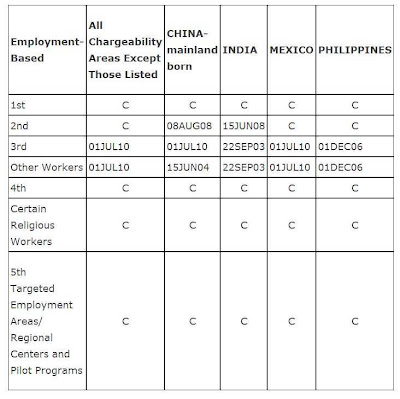Final Rules
A few rules that U.S.
Citizenship and Immigration Services (USCIS), Customs and Border Protection
(CBP), and Immigration and Customs Enforcement (ICE) will be implementing in
the coming months are relevant to HR professionals. These include:
·
By October 2013, CBP
will set the eligibility requirements and the application procedures and fees
for the U.S. Asia-Pacific Economic Cooperation Business Travel Card Program.
The program will enable eligible travelers to use fast-track immigration lanes
in cooperating Asia-Pacific nations.
·
The extension of U.S.
immigration law to the Commonwealth of the Northern Mariana Islands by December
2013.
·
A July 2014 final rule
implementing the Legal Immigration Family Equity Act, which will allow the
spouses and children of lawful permanent residents to live and work in the
United States while waiting for a green card.
·
The finalization of
interim regulations, by July 2014, precluding employers from filing duplicate
petitions on behalf of the same foreign temporary worker subject to the annual
H-1B numerical cap.
·
A final rule, planned
for July 2014, implementing the Nursing Relief for Disadvantaged Areas Act,
which created the H-1C nonimmigrant nurse visa in 1999 in response to the
shortage of qualified nurses in many regions of the United States. To qualify
for the H-1C visa, 500 of which are granted annually, a nurse must be licensed
or have obtained a nursing degree in the U.S. and must pass the NCLEX-RN exam.
Nurses with an H-1C visa may work in the United States for up to three years.
USCIS stopped accepting new H-1C petitions after Dec. 21, 2009, when Congress
failed to reauthorize the program.
Proposed Rules
USCIS proposes to extend employment authorization to certain H-4
dependent spouses of principal H-1B visa holders who have begun the process of
seeking lawful permanent-resident status through employment. “Allowing the
eligible class of H-4 dependent spouses to work encourages professionals with
high-demand skills to remain in the country and help spur the innovation and
growth of U.S. companies,” USCIS said.
A Notice of Proposed
Rulemaking is scheduled for October 2013 proposing to amend regulations that
clarify certain Form I-9 paperwork failures and violations. According to the
agenda, this proposed rule would define a substantive violation and a technical
or procedural failure and delineate the circumstances in which an employer may
be subject to penalties or not, due to a good-faith attempt to comply when
completing the form.
Another rule planned for October 2013 would allow students on
F-1 visas with degrees in science, technology, engineering or mathematics to
take advantage of a 17-month optional practical training extension to gain
experience in those fields.
And USCIS proposes to amend its regulations affecting
high-skilled workers from Chile and Singapore (H-1B1), Australia (E-3), the
Commonwealth of the Northern Mariana Islands (CW-1), and outstanding professors
and researchers (EB-1) by November 2013.
The rule would reconcile the regulations for these
classifications with existing regulations for other similarly situated
classifications “by removing unnecessary hurdles that place such workers at a
disadvantage when compared to similarly situated workers in other visa
classifications,” according to DHS.


